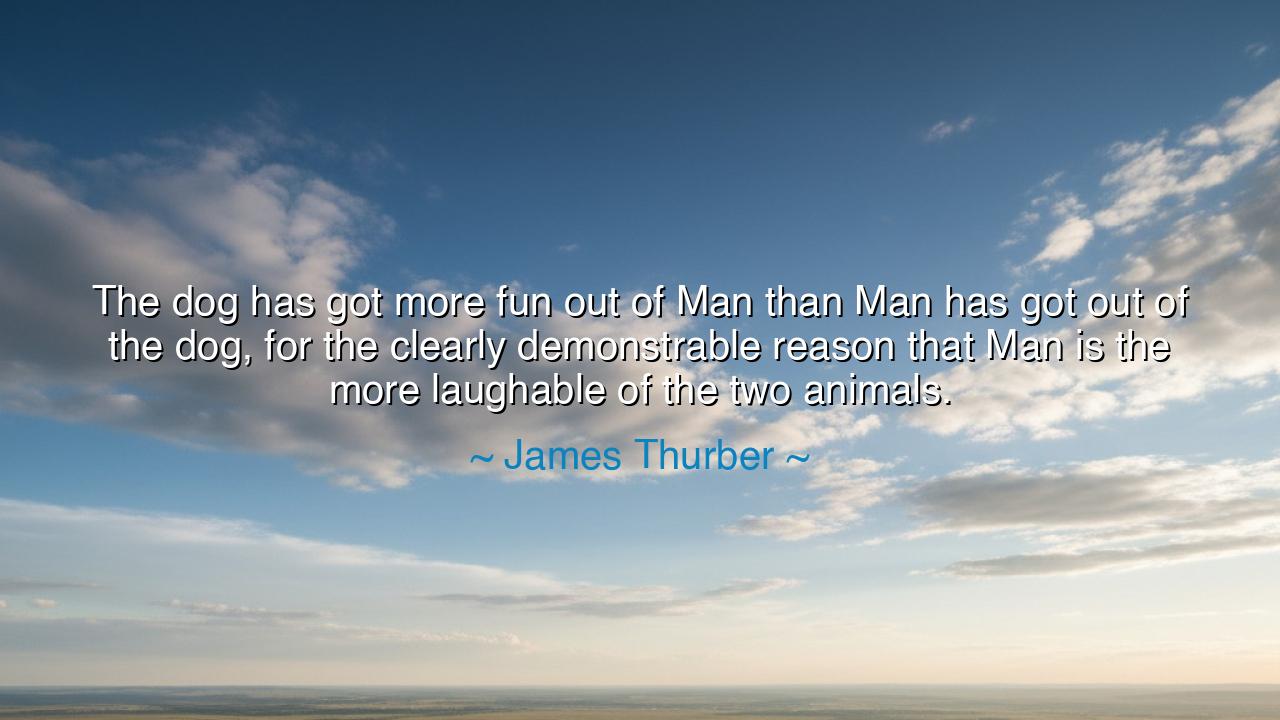
The dog has got more fun out of Man than Man has got out of the
The dog has got more fun out of Man than Man has got out of the dog, for the clearly demonstrable reason that Man is the more laughable of the two animals.






Hear now the witty yet piercing words of James Thurber: “The dog has got more fun out of Man than Man has got out of the dog, for the clearly demonstrable reason that Man is the more laughable of the two animals.” What seems at first a playful jest conceals within it a mirror held before the human race. For in this saying, Thurber reminds us of our follies, our vanities, and our endless absurdities. The dog, in its loyalty and simplicity, gazes upon mankind and finds amusement in the restless chaos of our ways.
The ancients knew well that animals often live nearer to truth than man himself. The dog, content with companionship, meat, and the warmth of fire, asks little of life, yet receives much. Man, in contrast, pursues glory, hoards wealth, quarrels over trifles, and invents endless burdens for himself. Thus, the dog, though dependent on man, finds in him a spectacle of foolishness, a source of endless entertainment. Thurber, with laughter in his pen, tells us that it is we, not they, who play the greater fool upon the stage of life.
Consider the tale of Diogenes the Cynic, the philosopher who lived more like a dog than a man, so much so that the Athenians called him “the Dog.” He rejected riches, mocked pretension, and lived with brutal simplicity. Once, seeing a boy drink water from his hands, Diogenes cast away his cup, declaring he had been carrying unnecessary weight. In this he revealed mankind’s comical tendency to complicate what is simple. The dog, by contrast, does not need such revelation—it has always known how to live with ease and joy. Thus Thurber’s words echo ancient wisdom: the dog, by its nature, is already free from the follies that make man laughable.
Think also of the countless moments when a dog watches its master pacing with worry, frowning over debts, or arguing over matters that will soon be forgotten. The creature does not understand these human storms, and perhaps that is its greatest wisdom. It wags its tail, ready for a walk or a game, while man wrings his hands over the invisible burdens of tomorrow. In that contrast lies the comedy of human existence, and the dog’s amusement. For where man frets, the dog delights. Where man stumbles over pride, the dog runs freely in the meadow of contentment.
And yet, beneath the laughter, there is no malice. The dog does not mock man with cruelty, but with affection, as a friend who knows his companion’s flaws but loves him still. It is perhaps because man is laughable that the dog loves him so deeply; the same follies that amuse also endear. This is the mystery of companionship—that even in our foolishness, we are worthy of loyalty, and even in our stumbles, we are worthy of love.
Thurber’s saying carries a lesson: if we are the more laughable, then let us learn to laugh at ourselves. Let us shed the weight of vanity and embrace simplicity, as the dog does. For there is no shame in being ridiculous—only in failing to see it. To acknowledge our foolishness is the first step toward wisdom. The dog has known this truth since the beginning, and waits patiently for man to discover it.
What, then, shall we do? First, let us not despise the laughter of the dog, but welcome it. Live simply. Delight in companionship. Find joy in the small and the present. Second, let us take ourselves less seriously, remembering that pride often blinds us, while humor sets us free. And third, let us honor the creatures who remind us of our absurdity, for in their mirth lies a gentle guide to a better life.
So remember Thurber’s words: “The dog has got more fun out of Man than Man has got out of the dog.” Live so that the dog’s laughter becomes your own. Let their joy, their loyalty, and their simplicity shape your days. For in their amusement lies not scorn, but truth—and in that truth, a path toward peace, humility, and a freer heart.






AAdministratorAdministrator
Welcome, honored guests. Please leave a comment, we will respond soon